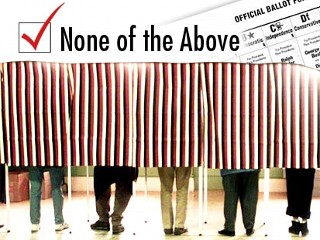 himself from third party activism, not to mention moderates, when he wonders: "if moderates can't get any respect from either party, why don't they form their own? Isn't it time to form a third party?" (emphasis added). He argues that they just might do so if the Republican party does not "appeal to the close to 40 percent who think of themselves as independent and who are personally centrist in their politics." The piece is thus part of the ongoing debate between moderate and conservative Republicans on the future of the GOP rather than a considered critique of the two-party system. In this sense, it perceives the potential for the formation of a centrist party as a threat, but not necessarily a mortal danger. Feehery allows that "it might be time for our politics to evolve to include a third party." However, despite this apparent openness, the logic of Feehery's analysis reveals the extent to which he is still trapped within the confines of duopoly ideology.
himself from third party activism, not to mention moderates, when he wonders: "if moderates can't get any respect from either party, why don't they form their own? Isn't it time to form a third party?" (emphasis added). He argues that they just might do so if the Republican party does not "appeal to the close to 40 percent who think of themselves as independent and who are personally centrist in their politics." The piece is thus part of the ongoing debate between moderate and conservative Republicans on the future of the GOP rather than a considered critique of the two-party system. In this sense, it perceives the potential for the formation of a centrist party as a threat, but not necessarily a mortal danger. Feehery allows that "it might be time for our politics to evolve to include a third party." However, despite this apparent openness, the logic of Feehery's analysis reveals the extent to which he is still trapped within the confines of duopoly ideology.The commentary is entitled 'No One Represents America's Center.' It concludes in a philosophical vein. Feehery writes:
America has been throughout its history living a kind of Hegelian dialectic. One party represents the thesis, the other the antithesis, and from that springs a grand synthesis.This notion of synthesis is just one more version of the worn out claim that the constant "push-and-pull" between the left and right, the Republican and Democratic Parties, leads to the formation of bipartisan policy somewhere in the space between the two. If this were true, it would undermine the article's central thesis, namely, that the center is unrepresented in American politics. One could furthermore conclude that, under the conditions of the 'grand synthesis,' it is rather those on the left and the right whose positions will go unrepresented once the bipartisan 'compromise' is reached. In such a situation, the typical response of the self-serving duopoly ideologist is well known: 'Hey, if both sides are dissatisfied, we must be doing something right.' Yet, as many of us are well aware, if both sides are dissatisfied, it may just be the case that the policy is doubly wrong.
A more productive Hegelian analysis of the two-party system might begin rather from some of the German philosopher's lines on government from the Phenomenology of Spirit, to which I've referred before in connection with Madison's views on faction. Hegel writes:
Government, a power to will and perform proceeding from a single focus, wills and performs at the same time a determinate order and action. On the one hand, it excludes all other individuals from a share in its deed, and, on the other, thereby constitutes itself a form of government which is a specifically determinate will and eo ipso opposed to the universal will. By no manner of means, therefore, can it exhibit itself as anything but a faction. The victorious faction only is called the government.












